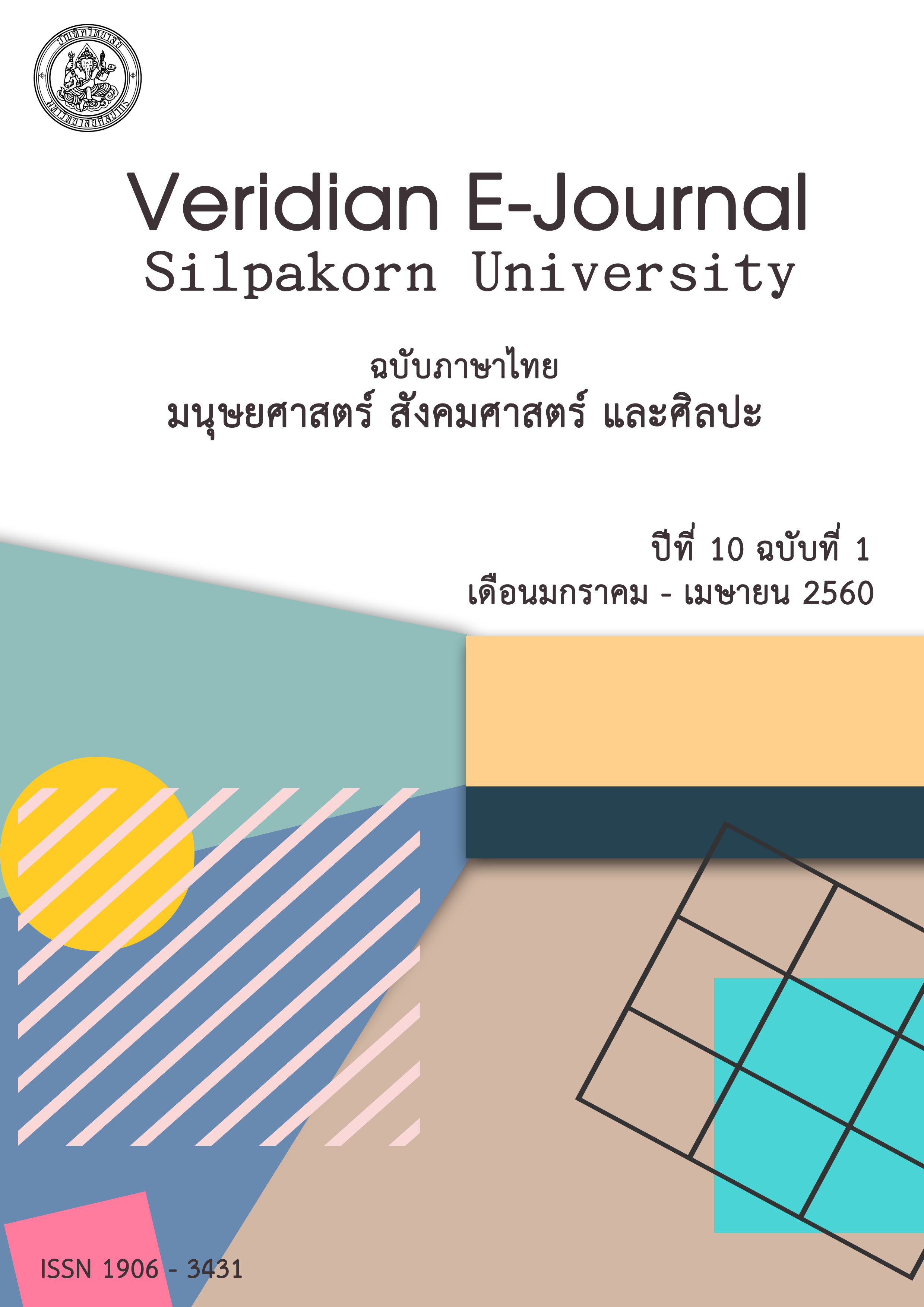การสื่อสารเพื่อจูงใจของผู้นำและวัฒนธรรมองค์การที่มีอิทธิพลต่อพฤติกรรม การเป็นสมาชิกที่ดีขององค์การ
Main Article Content
Abstract
การวิจัยนี้มีวัตถุประสงค์ 1. เพื่อศึกษาการสื่อสารเพื่อจูงใจของผู้นำ วัฒนธรรมองค์การ และพฤติกรรมการเป็นสมาชิกที่ดีขององค์การของพนักงานบริษัท ลิลลี่ โทเบก้า จำกัด 2. เพื่อศึกษาความสัมพันธ์ระหว่างการสื่อสารเพื่อจูงใจของผู้นำ และวัฒนธรรมองค์การที่มีต่อพฤติกรรมการเป็นสมาชิกที่ดีขององค์การของพนักงานบริษัท ลิลลี่ โทเบก้า จำกัด และ 3. เพื่อศึกษาอิทธิพลของการสื่อสารเพื่อจูงใจของผู้นำ และวัฒนธรรมองค์การที่มีต่อพฤติกรรมการเป็นสมาชิกที่ดีขององค์การของพนักงานบริษัท ลิลลี่ โทเบก้า จำกัด โดยใช้แบบสอบถามเป็นเครื่องมือในการเก็บรวบรวมข้อมูลจากกลุ่มตัวอย่าง คือ พนักงานบริษัท ลิลลี่ โทเบก้า จำกัด จำนวน 112 คน คัดเลือกกลุ่มตัวอย่างด้วยการสุ่มแบบอาศัยความสะดวก โดยเลือกตามเกณฑ์ความเต็มใจและยินดีที่จะให้ข้อมูล สถิติที่ใช้ในการวิเคราะห์ข้อมูล ได้แก่ การแจกแจงความถี่ ค่าร้อยละ ค่าเฉลี่ย ส่วนเบี่ยงเบนมาตรฐาน ค่าสัมประสิทธิ์สหสัมพันธ์ของเพียร์สัน และการวิเคราะห์ถดถอยพหุคูณ ผลการศึกษาพบว่า 1. กลุ่มตัวอย่างมีการรับรู้การสื่อสารเพื่อจูงใจของผู้นำอยู่ในระดับสูง กลุ่มตัวอย่างรับรู้ว่าองค์การของตนมีรูปแบบของวัฒนธรรมองค์การเชิงสร้างสรรค์อยู่ในระดับสูง กลุ่มตัวอย่างรับรู้ว่าองค์การของตนมีรูปแบบของวัฒนธรรมองค์การเชิงรับอยู่ในระดับสูง กลุ่มตัวอย่างรับรู้ว่าองค์การของตนมีรูปแบบของวัฒนธรรมองค์การเชิงรุกอยู่ในระดับปานกลาง และกลุ่มตัวอย่างมีพฤติกรรมการเป็นสมาชิกที่ดีขององค์การอยู่ในระดับสูง 2. การสื่อสารเพื่อจูงใจของผู้นำ วัฒนธรรมองค์การเชิงสร้างสรรค์ วัฒนธรรมองค์การเชิงรับ และวัฒนธรรมองค์การเชิงรุก มีความสัมพันธ์ทางบวกกับพฤติกรรมการเป็นสมาชิกที่ดีขององค์การของพนักงานบริษัท ลิลลี่ โทเบก้า จำกัด 3. ปัจจัยด้านวัฒนธรรมองค์การ คือ มิติเน้นความสำเร็จของวัฒนธรรมองค์การเชิงสร้างสรรค์ มิติเน้นความสมบูรณ์แบบของวัฒนธรรมองค์การเชิงรุก ร่วมด้วยปัจจัยด้านการสื่อสารเพื่อจูงใจของผู้นำ คือ การใช้ภาษาเพื่อสร้างกำลังใจ เป็นปัจจัยที่มีอิทธิพลต่อพฤติกรรมการเป็นสมาชิกที่ดีขององค์การของพนักงานบริษัท ลิลลี่ โทเบก้า จำกัด
The purposes of this study were to 1. Study the motivating language of leaders, organizational culture, and organizational citizenship behavior among employees of the Lily Tobeka Company Limited, 2. Study the relationship between motivating language of leaders and organizational culture toward organizational citizenship behavior among employees of the Lily Tobeka Company Limited, and 3. Study the effects of motivating language of leaders and organizational culture toward organizational citizenship behavior among employees of the Lily Tobeka Company Limited. A questionnaire was used in a population survey. The respondents were 112 employees by convenience sampling where respondents are selected because of their volunteering. The statistics that were used in data analysis were frequency, percentage, mean, standard deviation, Pearson's correlation coefficient, and multiple regression analysis. The results show that 1. Respondents perceived the motivating language of leaders, the constructive organizational culture, and the passive/defensive organizational culture at high level. Respondents perceived the aggressive/defensive organizational culture at moderate level, and respondents have high level of the organizational citizenship behavior. 2. the motivating language of leaders, the constructive organizational culture, the passive/defensive organizational culture , and the aggressive/defensive organizational culture positively related to organizational citizenship behavior among employees of the Lily Tobeka Company Limited, and 3) achievement of constructive organizational culture, perfectionistic of aggressive/defensive organizational culture and empathetic language of motivating language of leaders positively influenced organizational citizenship behavior.

